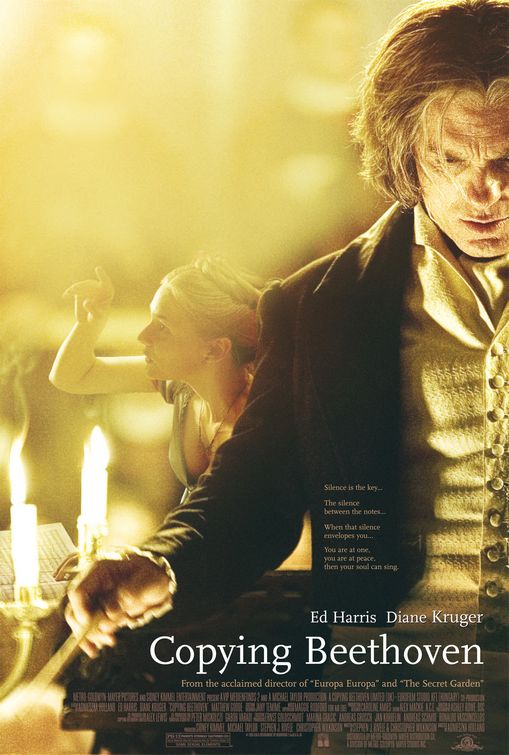“Honoring God through Beethoven’s Music”

| None | Light | Moderate | Heavy | |
|---|---|---|---|---|
| Language | ||||
| Violence | ||||
| Sex | ||||
| Nudity |
What You Need To Know:
COPYING BEETHOVEN is almost ruined by a few strong, anachronistic profanities and scatological jokes. Thus, MOVIEGUIDE® advises extreme caution. The heart of the movie, however, is the numerous positive statements that Beethoven makes about God. Accompanying these statements are Anna’s own repeated references to God, including scenes where she kneels and prays and makes the sign of the Cross and the Holy Trinity. Though in real life Beethoven struggled with God, COPYING BEETHOVEN strongly honors God in scene after amazing scene.
Content:
(CC, BBB, H, Ro, FR, RH, Fe, LL, V, S, N, AA, D, M) Strong Christian worldview with very strong positive references to God, including His benevolence, His connection to us as human beings and the importance of knowing Him, with some implied references to Jesus and the Holy Trinity, but man has some doubts and angry questions for God that are ultimately overcome by His connection and awe of God, which brings him hope of eternal life, with help from a young woman who lives at a convent while studying music in Vienna and who is sometimes shown praying (including dialogue about a “hymn of thanksgiving to God” and man says, “Music is the language of God. We are children of God who sing His praise. If we’re not that, we’re nothing”), plus some revisionist history with a light feminist conceit; six obscenities, six strong profanities, 12 light profanities, woman empties a chamberpot full of urine, minor character urinates in chamberpot, and some jokes about passing gas; light, brief dramatic violence, such as man demolishes model of planned bridge on display; no sex scenes, but young man rudely lifts up young woman’s skirt, light verbal rumors about sex, young woman washes older man’s naked chest, shoulders, feet, and ankles, and young woman and older man share a spiritual connection that is somewhat sensual but nothing happens romantically or sexually between them; upper male nudity and rear male nudity when older man “moons” a young woman as a crude joke deliberately designed to offend her; alcohol use and slight drunkenness in one or two scenes; pipe smoking; and, man is rude to his employees and other people, another man steals money, man deliberately irks neighbors below, and mention of a man’s gambling debts.
More Detail:
The movie fictionalizes Beethoven’s last three years by imagining a fictional character, a young aspiring female composer. Diane Kruger plays 23-year-old Anna Holtz, a student at the music conservatory in Vienna. It is 1824, the eve of the public premiere of Beethoven’s Ninth Symphony, but parts of the symphony are not ready. A music publisher urgently needs a copyist to help Beethoven finish the work, and Anna is available. Though using a female copyist is not done, the publisher has no choice but to send her to Beethoven’s cluttered apartment.
Anna sees the job as an opportunity sent from God to show the famous composer her work. She finds that Beethoven is cantankerous and rude. When, however, the skeptical Beethoven issues an impromptu musical challenge, Anna demonstrates her competence and musical insight. Beethoven accepts her as his copyist. This begins a remarkable platonic relationship that continues through a glorious public performance of the Ninth Symphony and lasts until the bittersweet end of Beethoven’s life in 1827.
COPYING BEETHOVEN is almost ruined by a few strong, anachronistic profanities and scatological jokes. Thus, MOVIEGUIDE® advises extreme caution. The heart of the movie, however, is the numerous positive statements that Beethoven makes about God. Accompanying these statements are Anna’s own repeated references to God, including scenes where she kneels and prays and makes the sign of the Cross and the Holy Trinity. Though in real life Beethoven struggled with God and his Roman Catholic upbringing, and probably was a deist, COPYING BEETHOVEN strongly honors God in scene after amazing scene, including the last two scenes. Ed Harris as Beethoven and Diane Kruger as Anna bring a passionate, spiritual reverence to the best of these scenes.
It should be noted that the German lyrics in the sublime musical climax of the Ninth Symphony, which appears in the movie, include positive references to God the Creator, Heaven and the divine source of sublime joy. The movie’s exhilarating sequence featuring the Ninth Symphony is one of the most gorgeous musical sequences you may ever experience in a movie. It’s even more powerful if you have heard this symphony before. Considered as just music, the Ninth Symphony truly is one of the greatest musical masterpieces of all time. It is a heavenly experience. That spiritual experience comes through beautifully in the movie’s mesmerizing sequence featuring this symphony.
Anyone who loves beautiful music and who loves God may be moved to tears by many of the God-honoring and music-honoring passages in this movie. COPYING BEETHOVEN is a very spiritually uplifting movie that ultimately affirms Christian sensibilities. As such, it perhaps can help the Church to tell people about the true godly meaning of beauty, including the shining beauty of Beethoven’s most important, beautiful music. Though deists, pantheists and even atheists may deny most of God’s revelation in the Bible, including His omnipotent existence, they may still be able to express part of God’s truth and beauty, no matter how inadequately. We must, however, learn how to discern the good and reject the bad. That is the beginning of media wisdom.


 - Content:
- Content: 

